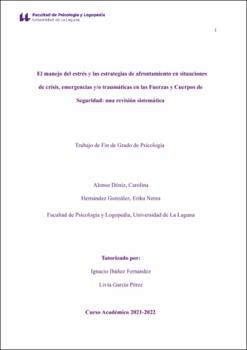El manejo del estrés y las estrategias de afrontamiento en situaciones de crisis, emergencias y/o traumáticas en las Fuerzas y Cuerpos de Seguridad: una revisión sistemática
Date
2022Abstract
El objetivo de esta revisión sistemática es conocer y estudiar los estresores a los que se
enfrentan las Fuerzas y Cuerpos de Seguridad y determinar cuáles son las estrategias de
afrontamiento que resultan más efectivas para abordar las situaciones de crisis, emergencias
y/o traumáticas concretas y específicas. Se ha realizado una búsqueda de la literatura en las
bases de datos electrónicas PubMed, PsycInfo y Scopus entre los años 2000 y 2022. De las
cuales, se recabaron 2468 artículos tras la eliminación de los duplicados. De ellos, 21
artículos fueron analizados a texto completo, 18 fueron excluidos por diferentes razones, y
finalmente 3 fueron incluidos. Los resultados mostraron que determinadas variables se
asocian con una mayor sintomatología del Trastorno de Estrés Postraumático (TEPT) y que el
optimismo, la integración social y la reevaluación positiva son estrategias de afrontamiento
eficaces, ya que disminuyen el riesgo de sufrir trastornos psicológicos. Asimismo, se
observaron patrones de afrontamiento tanto adaptativos como desadaptativos cuando las
Fuerzas y Cuerpos de Seguridad hacen frente a dichas situaciones, siendo lo óptimo en estos
casos, fomentar la aplicación de los que resultan más beneficiosos y facilitan el manejo del
estrés. Por último, cabe señalar que la bibliografía encontrada acerca de los fines descritos en
este TFG es escasa, por lo que se debe realizar mayor investigación en esta área. The aim of this systematic review is to know and study the stressors faced by the Security
Forces and Bodies and to determine which are the coping strategies that are most effective in
addressing concrete and specific crisis, emergency and/or traumatic situations. A literature
search was conducted in the electronic databases PubMed, PsycInfo and Scopus between
2000 and 2022. Of which, 2468 articles were collected after elimination of duplicates. Of
these, 21 articles were analyzed in full text, 18 were excluded for different reasons, and
finally 3 were included. The results showed that certain variables are associated with a
greater symptomatology of Post-Traumatic Stress Disorder (PTSD) and that optimism, social
integration and positive reevaluation are effective coping strategies, since they decrease the
risk of suffering psychological disorders. Likewise, both adaptive and maladaptive coping
patterns were observed when the Security Forces and Bodies face such situations, being the
optimal in these cases, to encourage the application of those that are more beneficial and
facilitate the stress management. Finally, it should be noted that the bibliography found about
the purposes described in this final degree project is scarce, so more research should be done
in this area.





